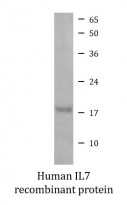ARG70050
Human IL7 recombinant protein (Active) (His-tagged, C-ter)
Human IL7 recombinant protein (Active) (His-tagged, C-ter) for SDS-PAGE
Overview
| Product Description | E. coli expressed, His-tagged (C-ter) Active Human IL7 recombinant protein |
|---|---|
| Tested Application | SDS-PAGE |
| Target Name | IL7 |
| Species | Human |
| A.A. Sequence | Asp26 - His177 |
| Expression System | E. coli |
| Activity | Active |
| Activity Note | Determinedd by its ability to induce PHA-activated human PBMCs proliferation. The ED50 for this effect is < 0.8 ng/mL. The specific activity of recombinant human IL-7 is > 1 x 10^8 units/mg. |
| Alternate Names | IL-7; Interleukin-7 |
Properties
| Form | Powder |
|---|---|
| Purification Note | Endotoxin level is less than 0.1 EU/µg of the protein, as determined by the LAL test. |
| Purity | > 95% (by SDS-PAGE) |
| Buffer | PBS (pH 8.0) |
| Reconstitution | It is recommended to reconstitute the lyophilized protein in sterile water to a concentration not less than 200 μg/mL and incubate the stock solution for at least 20 min at room temperature to make sure the protein is dissolved completely. |
| Storage Instruction | For long term, lyophilized protein should be stored at -20°C or -80°C. After reconstitution, aliquot and store at -20°C or -80°C for up to one month. Storage in frost free freezers is not recommended. Avoid repeated freeze/thaw cycles. Suggest spin the vial prior to opening. |
| Note | For laboratory research only, not for drug, diagnostic or other use. |
Bioinformation
| Gene Symbol | IL7 |
|---|---|
| Gene Full Name | interleukin 7 |
| Background | The protein encoded by this gene is a cytokine important for B and T cell development. This cytokine and the hepatocyte growth factor (HGF) form a heterodimer that functions as a pre-pro-B cell growth-stimulating factor. This cytokine is found to be a cofactor for V(D)J rearrangement of the T cell receptor beta (TCRB) during early T cell development. This cytokine can be produced locally by intestinal epithelial and epithelial goblet cells, and may serve as a regulatory factor for intestinal mucosal lymphocytes. Knockout studies in mice suggested that this cytokine plays an essential role in lymphoid cell survival. Alternative splicing results in multiple transcript variants encoding distinct isoforms. Additional splice variants have been described but their presence in normal tissues has not been confirmed.[provided by RefSeq, Dec 2010] |
| Function | Hematopoietic growth factor capable of stimulating the proliferation of lymphoid progenitors. It is important for proliferation during certain stages of B-cell maturation. [UniProt] |
| Cellular Localization | Secreted. [UniProt] |
Images (1) Click the Picture to Zoom In






